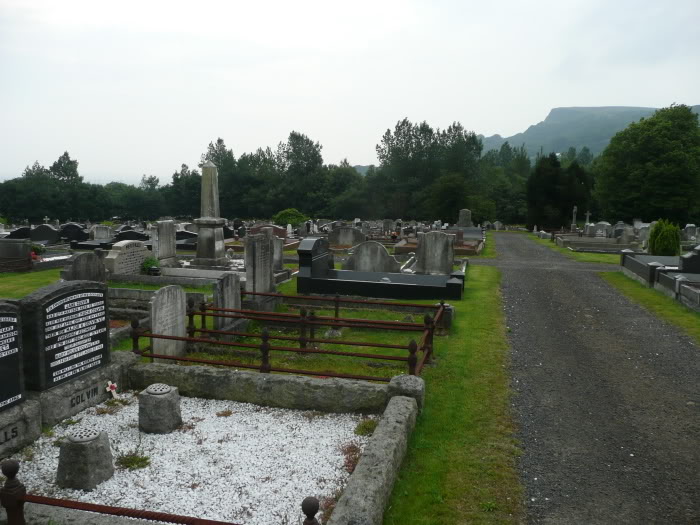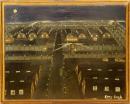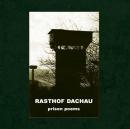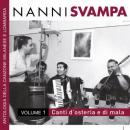As the day crawls out another night crawls in
Time neither moves nor dies.
It’s the time of day when the lark sings,
The black of night when the curlew cries.
There’s rain on the wind, the tears of spirits
The clink of key on iron is near,
A shuttling train passes by on rail,
There’s more than God for man to fear.
Toward where the evening crow would fly, my thoughts lie,
And like ships in the night they blindly sail,
Blown by a thought — that breaks the heart —
Of forty women in Armagh jail.
Oh! and I wish I were with the gentle folk,
Around a hearthened fire where the fairies dance unseen,
Away from the black devils of H-Block hell,
Who torture my heart and haunt my dream.
I would gladly rest where the whin bush grow,
Beneath the rocks where the linnets sing
In Carnmoney Graveyard ‘neath its hill
Fearing not what the day may bring!
Time neither moves nor dies.
It’s the time of day when the lark sings,
The black of night when the curlew cries.
There’s rain on the wind, the tears of spirits
The clink of key on iron is near,
A shuttling train passes by on rail,
There’s more than God for man to fear.
Toward where the evening crow would fly, my thoughts lie,
And like ships in the night they blindly sail,
Blown by a thought — that breaks the heart —
Of forty women in Armagh jail.
Oh! and I wish I were with the gentle folk,
Around a hearthened fire where the fairies dance unseen,
Away from the black devils of H-Block hell,
Who torture my heart and haunt my dream.
I would gladly rest where the whin bush grow,
Beneath the rocks where the linnets sing
In Carnmoney Graveyard ‘neath its hill
Fearing not what the day may bring!
envoyé par Bernart Bartleby - 13/8/2014 - 11:46
Langue: italien
Traduzione italiana di Riccardo Venturi
13 agosto 2014

13 agosto 2014

Belfast: Carnmoney Graveyard.
UN POSTO PER RIPOSARE
Mentre il giorno striscia via fuori, un'altra notte striscia dentro,
Il tempo non si muove e non muore.
È l'ora del giorno quando canta l'allodola,
Il buio della notte quando stride il chiurlo.
Pioggia portata dal vento, le lacrime degli spiriti,
S'avvicina il tintinnio della chiave sul ferro,
Un treno navetta passa via sui binari,
L'uomo ha da temere ben di più che Dio.
I miei pensieri stanno là dove volerebbe la cornacchia della sera
E come navi nella notte, navigano ciechi
Spinti da un pensiero che spezza il cuore:
Quaranta donne in prigione a Armagh.
E io vorrei sì essere con quella brava gente
Attorno a un focolare dove danzano le fate invisibili,
Via dai neri diavoli dell'inferno del Blocco H
Che mi torturano il cuore e mi tormentano i sogni.
Mi piacerebbe riposare dove cresce la ginestra spinosa,
Sotto le rocce dove cantano i fanelli
Nel cimitero di Carnmoney sotto la sua collina,
Senza aver paura di quel che il giorno può portare!
Mentre il giorno striscia via fuori, un'altra notte striscia dentro,
Il tempo non si muove e non muore.
È l'ora del giorno quando canta l'allodola,
Il buio della notte quando stride il chiurlo.
Pioggia portata dal vento, le lacrime degli spiriti,
S'avvicina il tintinnio della chiave sul ferro,
Un treno navetta passa via sui binari,
L'uomo ha da temere ben di più che Dio.
I miei pensieri stanno là dove volerebbe la cornacchia della sera
E come navi nella notte, navigano ciechi
Spinti da un pensiero che spezza il cuore:
Quaranta donne in prigione a Armagh.
E io vorrei sì essere con quella brava gente
Attorno a un focolare dove danzano le fate invisibili,
Via dai neri diavoli dell'inferno del Blocco H
Che mi torturano il cuore e mi tormentano i sogni.
Mi piacerebbe riposare dove cresce la ginestra spinosa,
Sotto le rocce dove cantano i fanelli
Nel cimitero di Carnmoney sotto la sua collina,
Senza aver paura di quel che il giorno può portare!
×
![]()










Versi di Bobby Sands, dalla raccolta “Prison Poems”, pubblicata nel 1981.
Alcune poesie di Bobby Sands, compresa questa (e The Sleeping Rose), sono state messe in musica da un gruppo austriaco, i Rasthof Dachau (genere industrial), nel loro disco (pubblicato nel 2006) intitolato come la raccolta poetica del combattente repubblicano morto in carcere nel 1981.
Una poesia in cui Sands descrive molto umanamente lo sconforto dovuto alla prigionia in mano ai “diavoli neri” nell’inferno dell’H-Block a Long Kesh, dove stava rinchiuso. Nell’ultima strofa Sands arriva ad augurarsi la morte per poter avere finalmente la pace, là nel quieto cimitero di Carnmoney, vicino a Belfast.
Il riferimento alle prigioniere dell’IRA rinchiuse nella prigione di Armagh, mi induce a datare la poesia al febbraio del 1980, quando proprio ad Armagh le combattenti repubblicane iniziarono la loro “dirty protest” per il riconoscimento dello status di prigioniere politiche… Si vedano al proposito le canzoni Armagh, The Armagh Women e Up in the Armagh Prison (Bernadette Devlin).